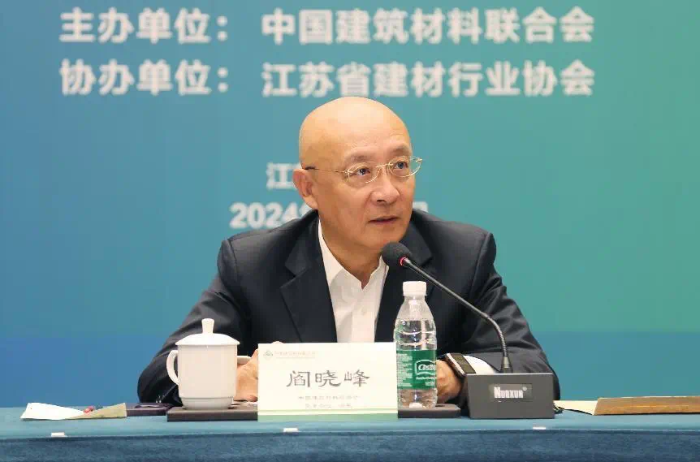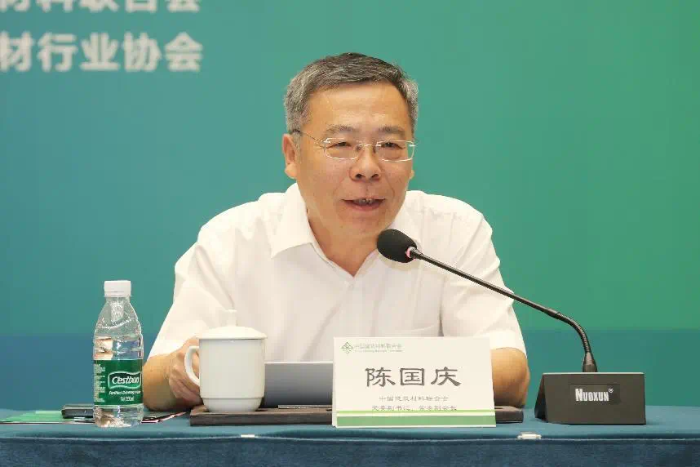On September 27, 2024, the Provincial and Municipal Building Materials Industry Associations Symposium was held in Nanjing. Organized by the China Building Materials Federation (CBMF) and co-hosted by the Jiangsu Provincial Building Materials Industry Association, the symposium was themed "Strengthening Four Service Consciousness and Jointly Promoting the Green, Low-Carbon, Safe, and High-Quality Development of the Industry." The event aimed to implement the decisions and policies of the Central Committee of the Communist Party of China and the State Council, and to better guide and promote the role of building materials associations at all levels in the new era, discussing new models for collaborative efforts towards green, low-carbon, safe, and high-quality development in the industry.

The President of CBMF, Yan Xiaofeng, attended the meeting and delivered a speech. CBMF Deputy Party Secretary and Executive Vice Chairman, Chen Guoqing, provided an overview of the federation’s work. Honorary President of the Jiangsu Provincial Building Materials Industry Association, Nie Changlan, gave a welcome address. Also in attendance were nearly 60 other representatives, including presidents and secretaries-general from building materials associations in 23 provinces, autonomous regions, and municipalities such as Beijing, Hebei, Shanxi, Liaoning, Jilin, Heilongjiang, Zhejiang, Jiangxi, Shandong, Hubei, Hunan, Guangdong, Chongqing, Guizhou, Tibet, Shaanxi, Gansu, Qinghai, and Chengdu. The meeting was chaired by Zhang Dongzhuang, Vice President of CBMF.

In his speech, Yan Xiaofeng emphasized that industry associations and chambers of commerce are an indispensable part of China’s socialist market economy. He noted that associations gain relevance through their contributions to the broader development of the nation and society. Associations should consider national conditions when addressing issues and fulfilling their responsibilities, serving as a vital bridge between the government and their members. He urged associations to provide data, analysis, and comparisons to clearly communicate the current status of the industry, regions, and enterprises, as well as to offer operational policy recommendations, becoming trusted advisors to the government and continuously enhancing their influence and appeal to member units.
Yan Xiaofeng further elaborated on CBMF’s innovative efforts in “dual carbon” initiatives, policy research, technological innovation, standards and quality, and international cooperation, outlining the federation’s guiding principles: “set the direction, define the positioning, establish the goals, focus on major issues, build mechanisms, and promote development.” He also introduced seven critical action points that industry associations must prioritize to proactively address opportunities and challenges:
1. Assist government departments in conducting research and providing feedback.
2. Help enterprises express reasonable demands.
3. Guide enterprises in achieving high-quality development according to economic and market principles.
4. Encourage enterprises to invest with a future-oriented vision.
5. Promote enterprises to benchmark against international and industry leaders, ensuring sustained competitiveness and facilitating their global expansion.
6. Advocate for corporate social responsibility and the practice of ESG (Environmental, Social, and Governance) principles.
7. Support fair competition and oppose monopolistic and malicious dumping behaviors.
He stressed the importance of upholding commercial civilization, thinking rationally, making scientific judgments, and operating legally while adhering to contract principles and fulfilling social responsibilities. Yan called for responsible leadership and companies in the building materials industry to form a collaborative mechanism, contributing to new achievements for the entire industry.
In his report, Chen Guoqing introduced three key initiatives undertaken by the CBMF since its sixth council meeting. First, the federation established the industry development goal of "superior products and advanced industry, for the benefit of mankind," along with 13 comprehensive improvement measures that resonated strongly within the industry. Second, it promoted the adoption of the "dual carbon" strategy, actively guiding the industry towards a green, low-carbon, safe, and high-quality development path. Third, it creatively proposed that Party organizations should play a leading role in association governance, integrating Party building with business operations to drive industry development. Chen also proposed suggestions for enhancing cooperation between the CBMF and provincial and municipal associations.

During the symposium, representatives from various provincial and municipal associations shared their experiences in serving the government, assisting members, and promoting industry development. They also engaged in in-depth discussions on further deepening cooperation and maintaining regular collaborative exchanges.
The CBMF, in collaboration with provincial and municipal associations, issued a joint initiative calling on building materials associations at all levels to fully leverage their advantages in the following five areas:Elevate political awareness and build consensus on development. Enhance the "Four Services" and fulfill functional responsibilities.Promote shared benefits and achieve common development.Establish a regular communication mechanism.Operate in compliance with laws and regulations to promote fair competition.
The initiative underscored the importance of collectively striving to realize the industry's vision of “Building a Harmonious Industry and Benefiting Humanity,” and contributing to a new chapter in the modernization of China's building materials industry.




